Interview 040 • Feb 23rd 2016
- INTERVIEW BY LOU NOBLE,
- GRACIE HAGEN PHOTOGRAPHED BY LUCY HEWETT
About Gracie Hagen
Gracie Hagen is an artist that currently resides in Chicago & is completely self taught. As a result, she's developed a unique aesthetic guided only by her desire to create the type of images that appeal to her. Her work has been featured on The Huffington Post, Beautiful Decay, The Daily Mail, & more.
Links
Foreword
It's rewarding, talking to someone in flux, someone still able to learn and grow. Speaking with Gracie was inspiring, hearing her talk about her work, which hits not just on a purely visual level, but also tackles crucial social issues in ways that don't overwhelm the work, but rather lift it up. Striking photos that provoke thought and discussion, an almost impossible goal Gracie seems to handle with ease.
This interview has been edited for clarity and content.
Interview
First off, how did you get started?
I originally wanted to be a filmmaker, so I got a Canon T3i, because it had the filming capabilities, and was relatively cheap, but was also a camera, and then I just started taking pictures and realized that it was way easier to do than making films.
This is true!
Ha! So I just kept doing that. And again, was lazy, and decided that it was way easier, so I just kept doing it, hahaha!
What were you doing before you decided to become a filmmaker?
Well, I stopped going to school, so nothing I’ve learned in school is relevant to me today.
Sweet, I’m sure that’s not true!
Well, for me, anything that’s important that I want to learn, anything that I actually care about, I’ll go out and make an effort to learn it. So photography, or video work, or literature, I’ll go out and read it, or do it. I forgot what your question was!
What were you doing before you decided you wanted to be a filmmaker?
I wasn’t doing anything. I was like, working at Borders…and then, what else was I doing…
That was a bookstore, for our young readers.
Hahahaha, yeah (sigh of nostalgia for a time when everyone knew what bookstores were)! So that’s what I was doing, and then I kind of just, I was trying to figure out what it was that I wanted to do, so I was like, “maybe I should be a blogger,” and was doing that for a hot second, then I was like, “no, this is stupid.” And then I was just doing random jobs, and just discovered that I like photography, and here I am!


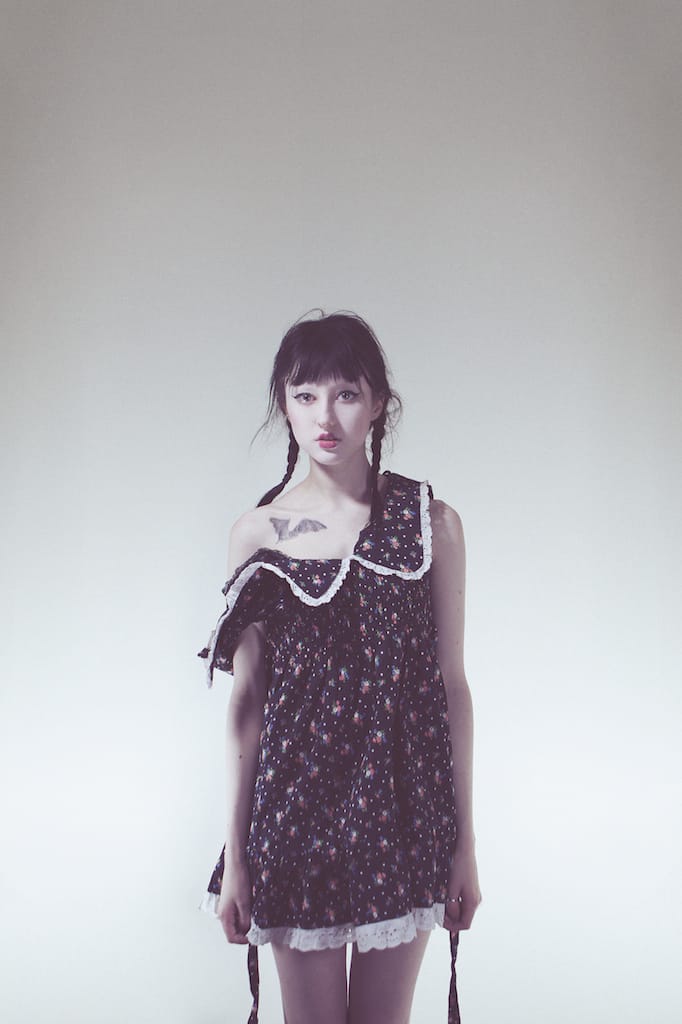

microtia
Affect vs Effect
Model: Andres Alvarez
blossom
Model: Shilo Suicide
Heheh. And how old were you when you decided that you wanted to get into photography?
Well, for serious photography, actually taking pictures versus like, I had a camera but didn’t do anything with it? Four years ago, so…24?
Okay.
So I’m 28. I will be 28.
Oh, happy birthday in the future.
Hahahah, I’m really bad at math, so I had to…
I don’t do math. I haven’t done math in twelve years.
Yeah, it is not fun.
I just avoid it. And, I see that your work is…it seems like it’s very project-focused.
Yeah.
What is it that you look for in a project that you’re putting together?
Usually it’s something that, for the most part, it’s always been something that I feel needs to be talked about, or discussed socially, or personally, or whatever. And obviously, because I’m human, it involves-
Wait wait, back up!
I am a human being!
I’ve made a horrible mistake!
Hahahaha! So it involves what it means to be human, essentially, and it comes from my experience, because I can’t talk about anybody else’s experience because it’s mine. So my view on X, Y, or Z. Back in the day, obviously, everybody hates their old work, so I did something on religion, and looking back now, I can see what I was trying to do, and I’m sure in five years I’ll look back and be like, “oh I see what you’re trying to do,” and pat my young self on the head, like where I was going. So my religious one, I didn’t really, I kind of just did portraitial versions…you don’t like that word?

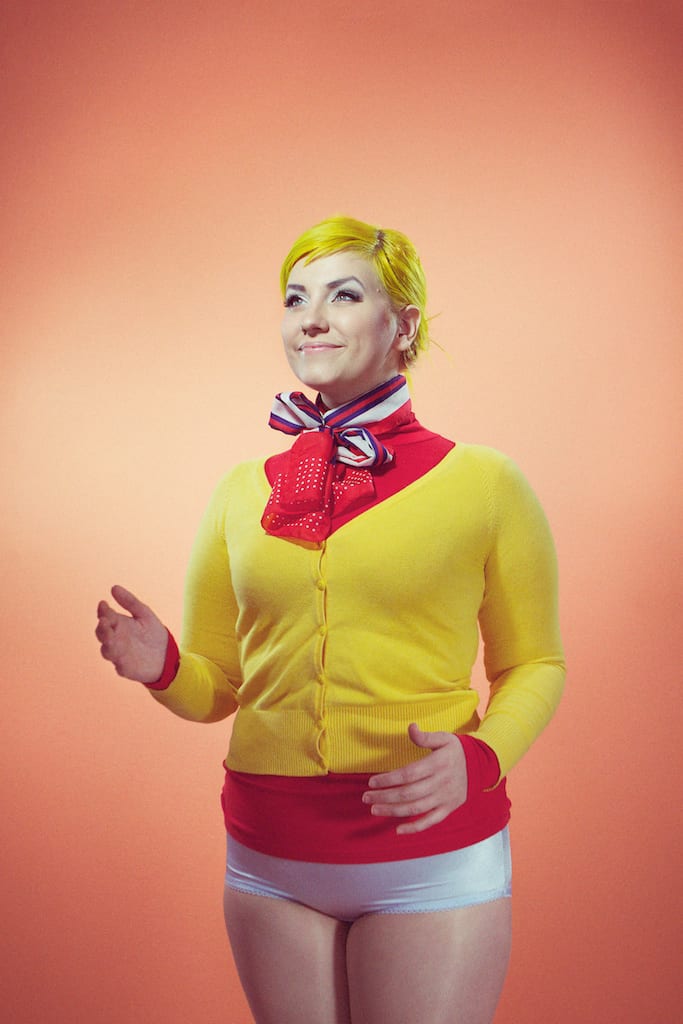


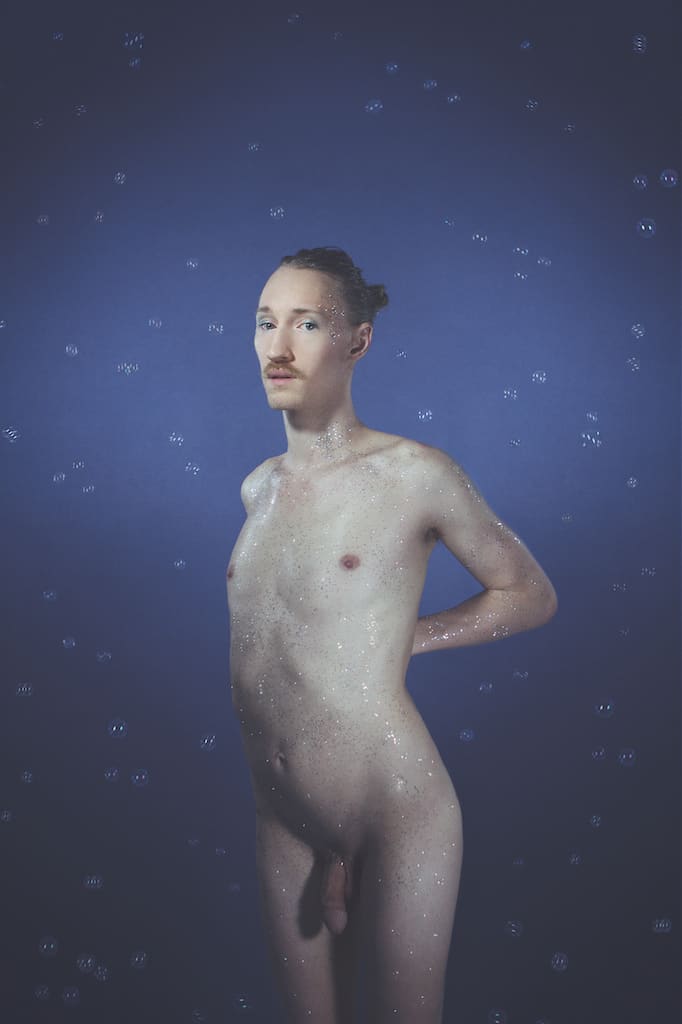


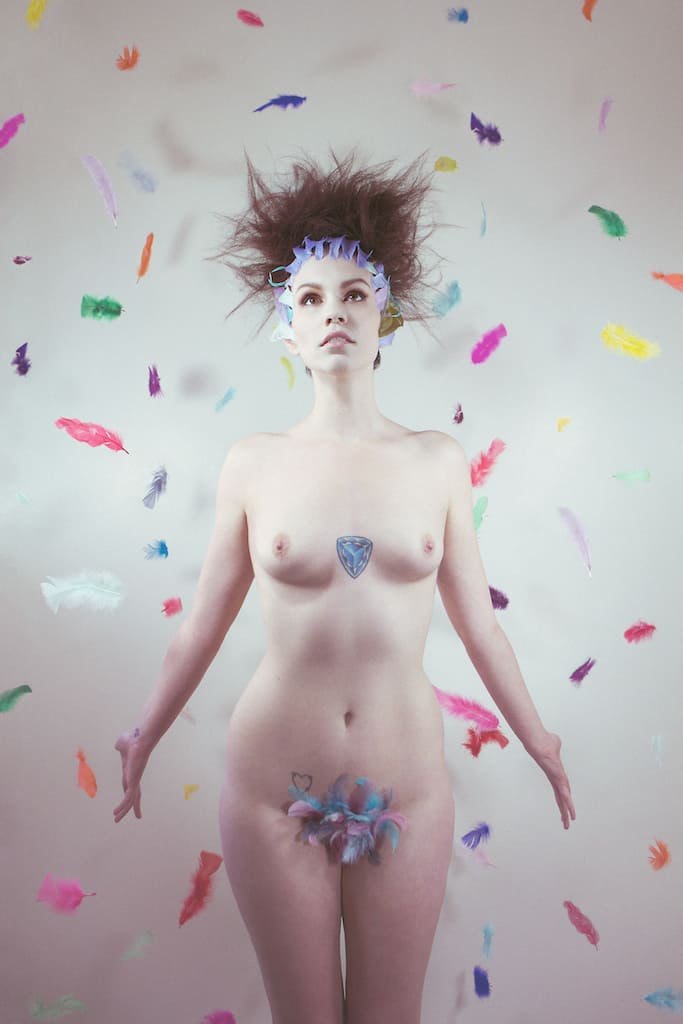


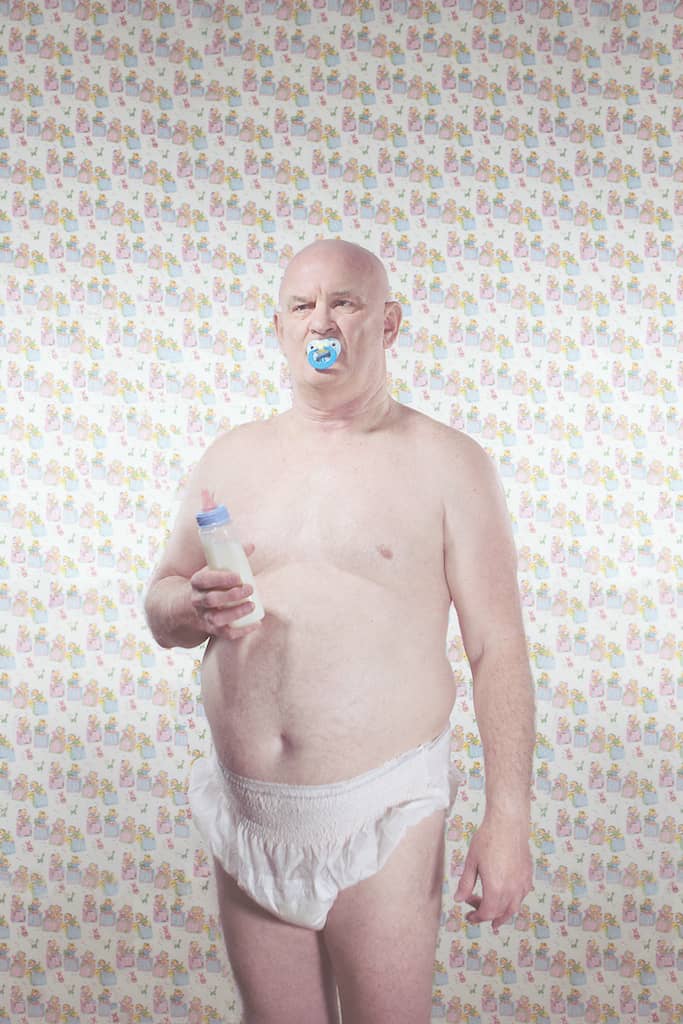

Images from No Judgement Here – An exploration of fetishes.
That’s not…”portraitial,” that’s not a word!
Whatever, it is now! I did versions of what I thought about religion, rather than with…I’m trying to think. It’s kind of hard, because I haven’t been very prolific the past few years, because I had to be an adult and get a real job, and also I feel like I went into an artistic slump because I was creatively freaking out. So if you’re freaking out, for me anyway, I didn’t know what to do, so I just stayed where I was. Point being, I didn’t, haven’t made that much recently, so I don’t, so I don’t have a lot of comparison from now to then.
Mhmm.
But my new series, which hasn’t been released yet, I feel like is more of what I want to do, and an upcoming series is more of what I want to do. And, again, I still don’t know if I’ve figured out what I want to do. This sounds like a fucking crazy person!
Hahahaha!
I still don’t know exactly what I’m trying to do, and how I’m trying to do it; I’m still figuring it out. But my upcoming series follows a woman who has had a double mastectomy, a breast reconstruction surgery, and I followed her for about two years, taking pictures of each surgery and the healing process. Showing, wanting to show what someone going through that what that process was like, because usually, you see before and after, you don’t see what happens in between. So people who are thinking about going through this, or have gone through it, or people who don’t know what it is, have the ability to see what it’s like, but it’s my portrait style mixed with that, which I think is interesting…I feel stupid talking about my work. “Oh, it’s so interesting!”
This will be a great interview, then!
Hahahaha! But then I have a new series that I’m working towards shooting, I’m coming up with the ideas. It’s about relationships, and each photo will be an aspect of a relationship. Like anger, happiness, intimacy, finances, blah blah blah blah, and I am doing something a little bit different. I’m doing something that I’ve never done before, and if it doesn’t work it doesn’t work, but it’s better than just doing the same thing all the time. And I tangent-ed and forgot what exactly what you asked me.
If it makes you feel any better, so did I.
Hahahahahha!
What was your creative freak out all about?
I don’t know. I think it was probably some personal stuff, too, where I was just stuck, as a person, and didn’t know how to fix whatever it was that was going on with me. And I’m kind of OCD and kind of anxious, and so I fixate on something, and if it’s not fixed, I can’t move on, and I didn’t know how to fix it, so it was this cluster fuck of stress and stupidness. I’m still a little bit that way, but I’m hoping that I’m moving forward, but it was just one of those things where I didn’t know what to do creatively, but I knew I should make stuff, but didn’t know what to make.
Right.
You’re supposed to keep creating stuff, which is how you become more creative, blah blah blah. But I couldn’t get past that point of just like being, “it’s okay if you make something shitty, just make something,” but I obviously can’t do that.
But you feel like you’re working your way out of there?
Yeah, I think I am. I also think I’ve come to terms over the past couple months realizing that just because I’m not making as much stuff as I was two years ago, doesn’t mean that I am less of an artist, or less of…I don’t need to be this ideal to be an artist, if that makes sense? I think the past years I have been fighting how my life is not exactly how it was two years ago, where it was super-easy and I had income I didn’t have to worry about, and I had all the time, and now I have none of that. I was just frustrated and mad that I didn’t have any of it, and I was wasting all my energy being frustrated and mad.
That’s a good place to focus. (sarcasm font)
I was wasting time, instead of just accepting that I don’t have a lot of time, I don’t have a lot of money, but so what, use the time that you have to do what you want, not be mad about it.
This is good. Note, for the audio record, she is currently in the Home Alone pose.
Hahahahha!
I noticed, I found your Flickr page, which is actually a great kind of chronicle of your progress over the past few years, I noticed that your signature style, which is very distinct, came about right around 2012; do you remember how you figured out that that’s how you want to shoot: a very bright key light, but very colorful with the background, very posed subject?
I don’t think there was an “ah-ha!” moment, but I do remember…it would probably be pretty interesting for me to look back and see what it looks like, but I do remember shooting Echo Nittolitto, do you remember that model?

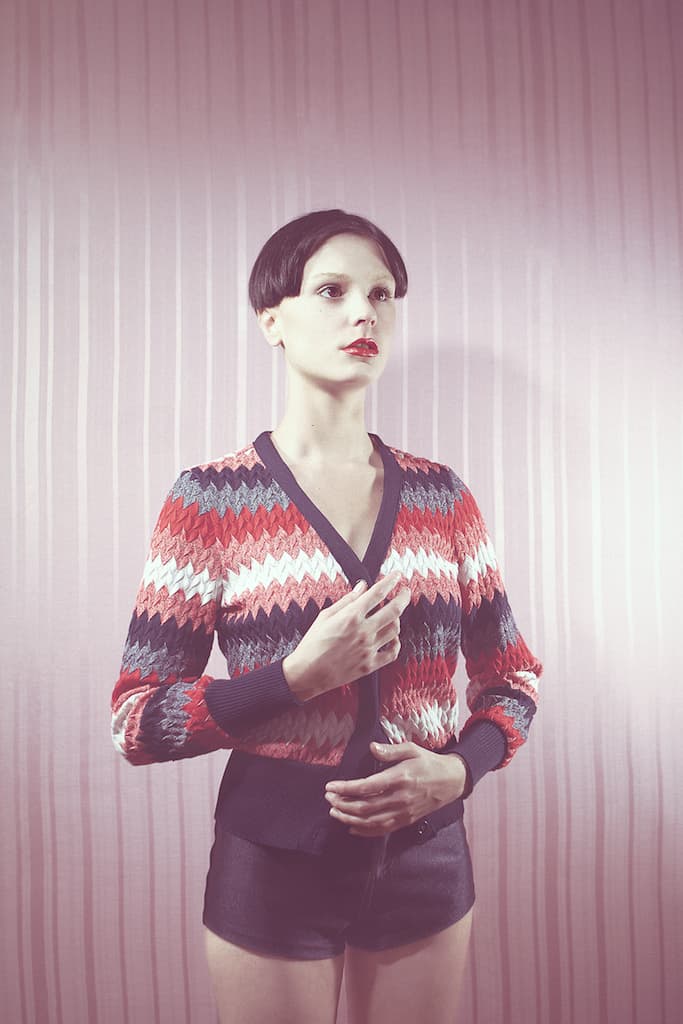

lion heart
I do!
She doesn’t model anymore, I don’t think. But she was the only model that I’d paid, and it was early on, I remember setting up a light, it was a pink background, she’s wearing a sweater, she’s very posed. And I remember setting up my lights, and it was taking a long time, because I didn’t know how to do the lighting, I was still figuring that out. And she was super-helpful, she wasn’t rude or condescending in any way, she was actually on my level being helpful. She was like, “yeah, you should-” this sounds condescending, but it wasn’t at all, “you should really invest in figuring out how to do the lighting, because it’s really important!” And I remember that, and took it to heart, and figured out what I wanted to do with lighting, and then it kind of went on from there. I’ve always been into more minimal aesthetic in general, like my apartment, there’s nothing on the walls really, except for…I make my apartment the art piece instead of putting art on the walls, if that makes sense? So everything is very minimal and clean, so I carry that over to my art. When I take a picture, I want everything to be centralized on one thing, but it is minimal in itself. But again, I might change how I shoot, I have no idea. As of right now, that’s kind of my aesthetic.
What is it you like about that minimalist style?
I don’t know, maybe it’s my OCD, where I like things clean and I like things to be efficient, and it seems like minimal is efficient and not chaotic. There are some things where I’ve seen, it’s like chaos…a big pile of toys, right? It’s a picture of toys, just a big junk pile, but all the toys are one color.
Ah!
It’s chaotic, but minimal.
Yeah.
That is the thing that I like!
I see. So more of a chaotic good, or a chaotic neutral.
Yeah. I’m pretty sure it ties down to my OCD, probably.
Are you sitting in a blank room right now? That’s the secret, that your entire house has nothing in it, just a bed.
I could show you! Wait…there you go. (this is where Gracie spins her laptop around, showing our intrepid interviewer her room)
Woooah! Yeah!
So it’s like a dark room, but there’s only white things on the wall.
It’s your Hannibal room!
Oh, yeah! I need to watch season 3, I haven’t watched it yet.
You know what, it’s…
Don’t say anything! I don’t want any expectations!
It’s got 13 episodes, and there are actors in it!
And Gillian Anderson is in it, and she’s so pretty!
She’s in it quite prominently, she’s a fine actress. Captivating…but secretly, that’s not your apartment, you went to a more…more decorated apartment, just so then no one knows that you live in an apartment with nothing in it.
I don’t want to make myself sound like a crazy serial killer, I’m not!
No, serial killers actually seem like really normal people.
Yeah…I feel like they also probably have…who is it…Ed Gein was a horder, he would eat cans of beans, and then just throw the can on the ground, so when you went into his house, there was just trash everywhere. Anyway…
Well, he was also a fine…I don’t know.
Ahahahha! He was an artist! He painted the skins of things?

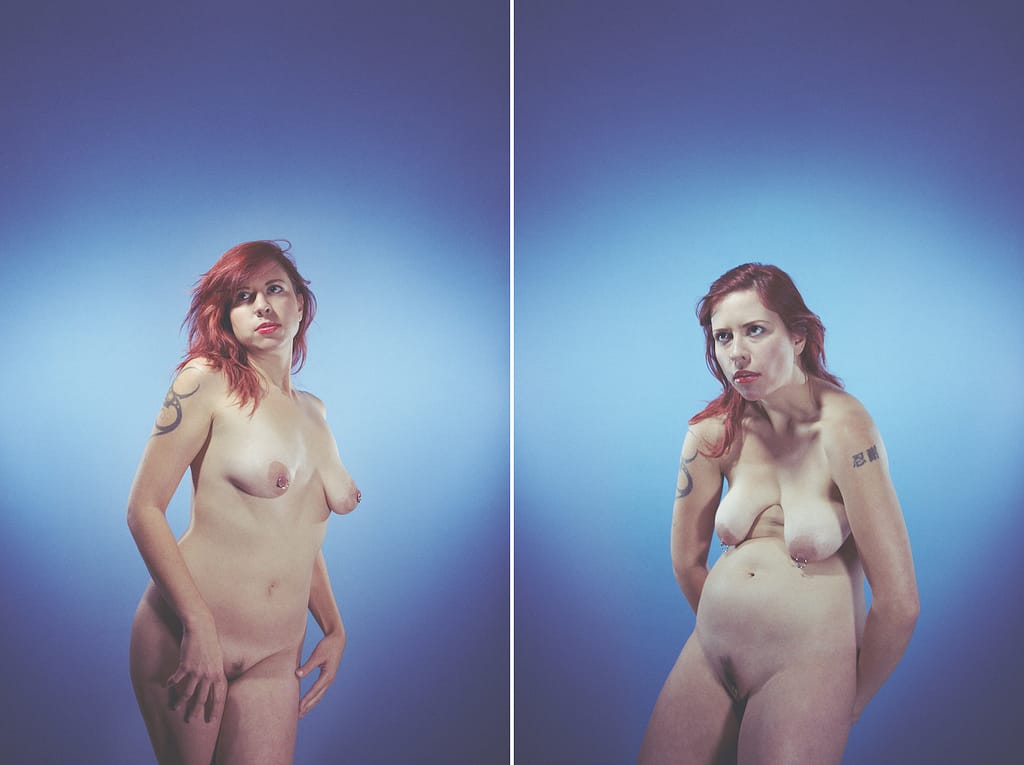


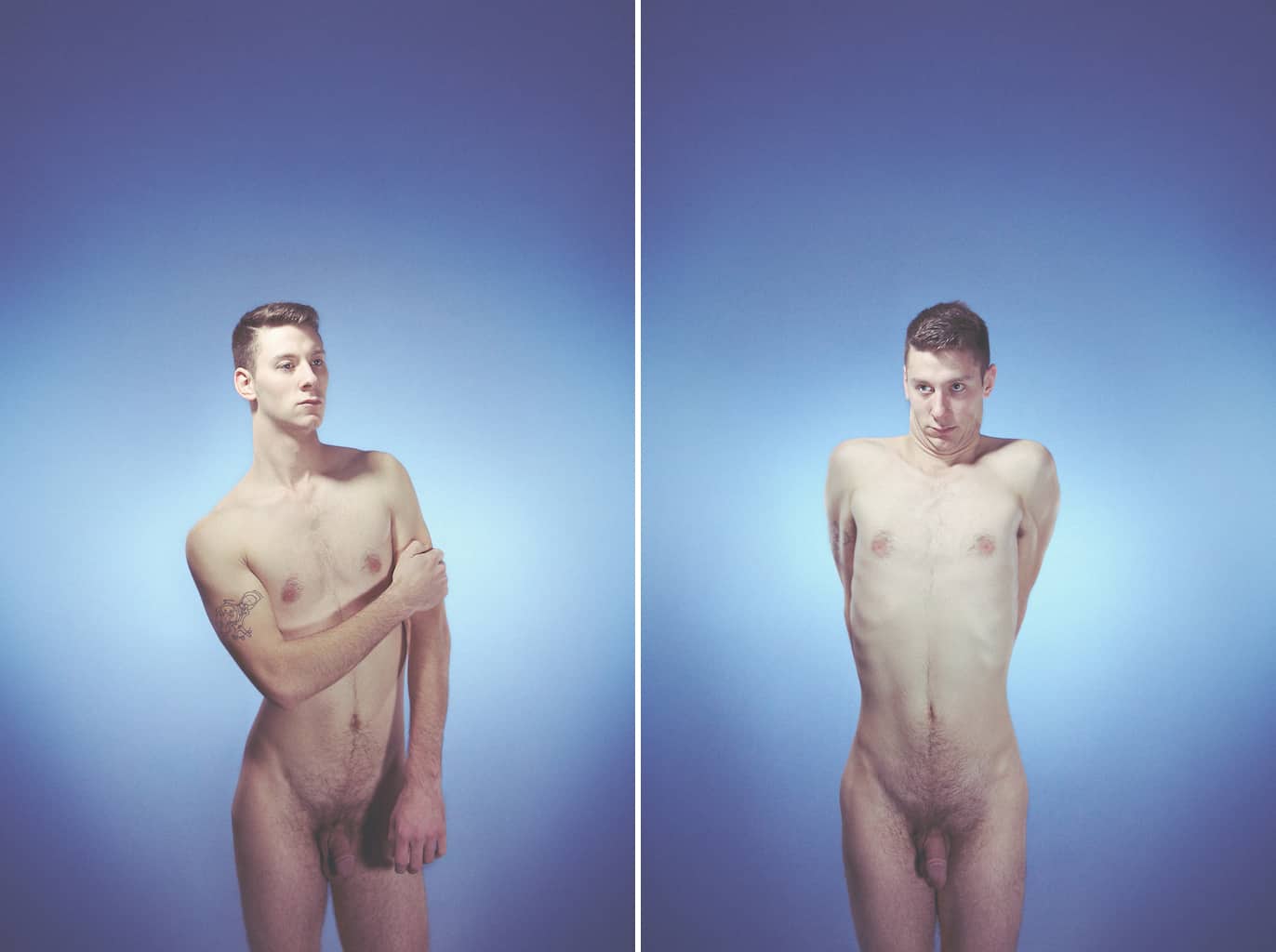


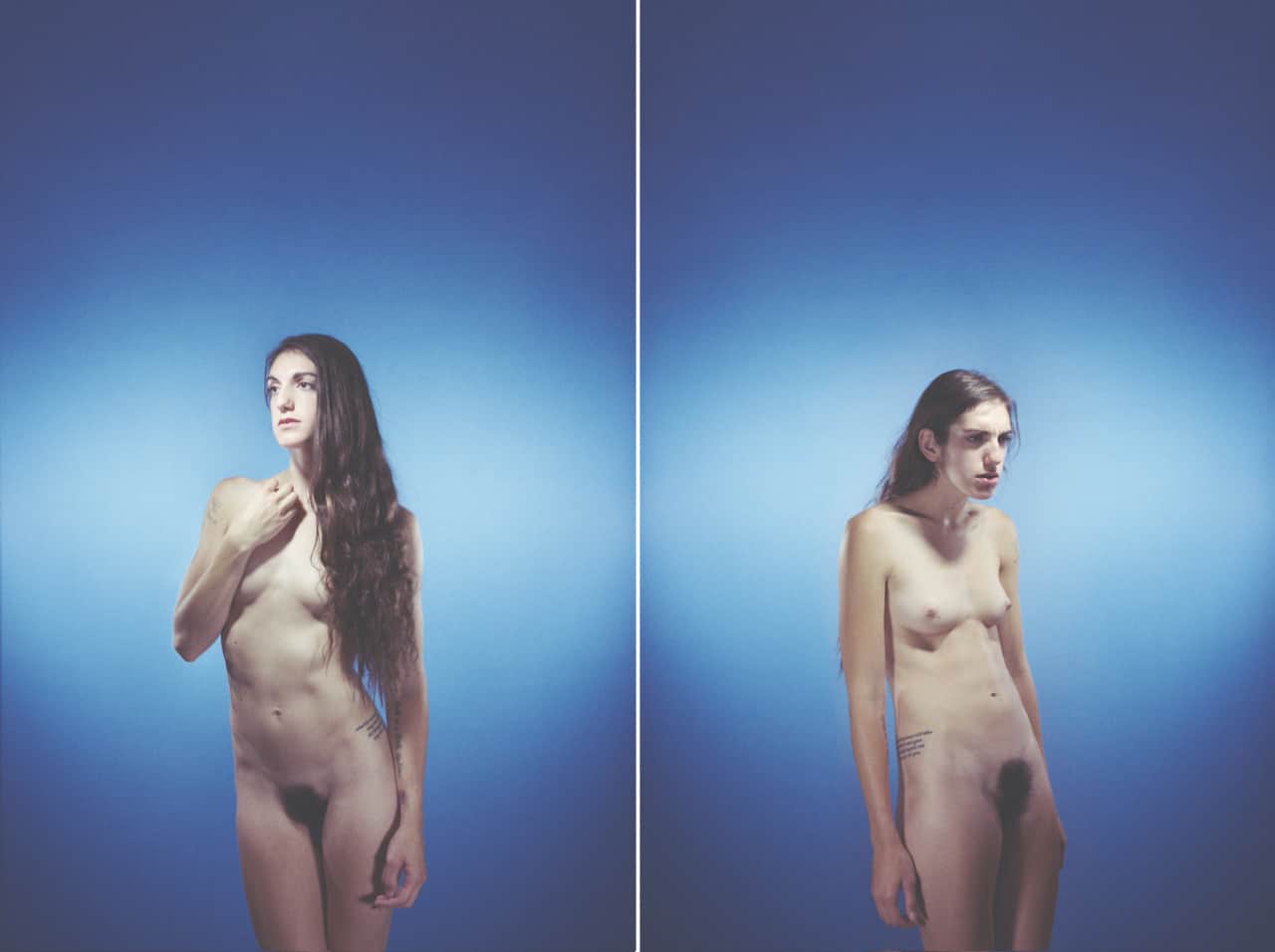


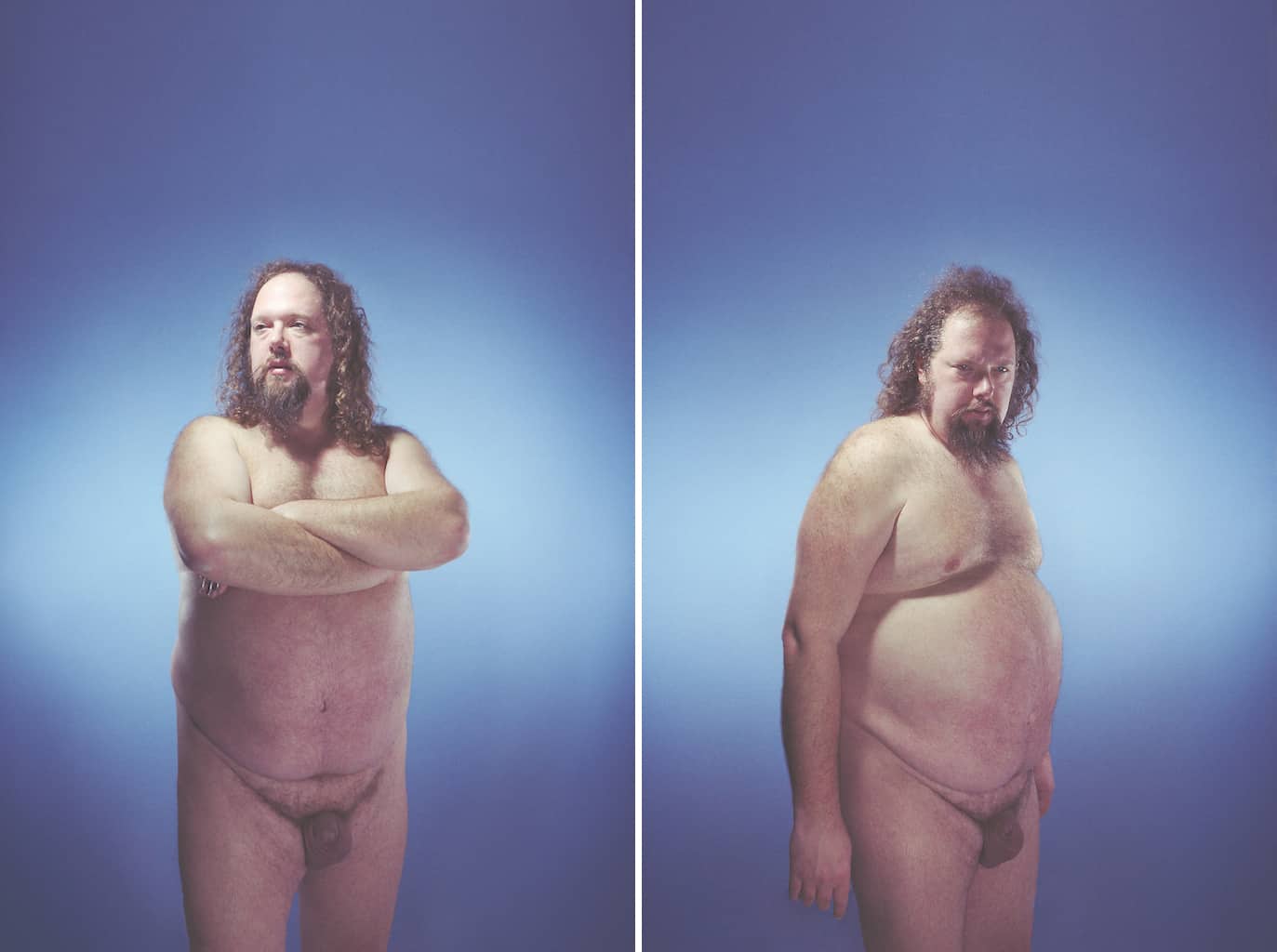

Images from Illusions of the Body – a series made to tackle the norms of what we think our bodies are supposed to look like.
He was a fine artist, he was a painter I believe, actually. Speaking of skin, there’s a lot of body-positive impressions I get from your work. When you talk about how you want to explore personal stuff, how do you find…the projects you’ve done, tend to be either body-oriented, or, not sex-oriented, but…obviously, there’s your project of fetishes; is there a reason that the issues you’re dealing with in your photography tend to be physically based?
Yeah. I think that those things are prevalent in my work because I think that that is something that, in our culture, needs to be talked about. So Illusions of the Body is clearly the most popular thing I’ve done. That specifically is way more geared towards body-positivity in a specific way, something that I think I was probably working towards. Not, maybe not working towards, but that was the through-line in all my one-off photos, where I wanted to get pictures of people, every kind of person’s body type, that I had access to; obviously I’m missing a lot of different types of people, but I didn’t have access to them. I like showing not the same thing all the time, because that’s not reality. I wanted to show all the different shades of grey that exist, because that’s life. So I would take photos in my style before I went on to series and stuff with different body types, because I thought that was interesting. Illusions of the Body was the epitome of that idea, showing that looking at an image isn’t what someone looks like in real life, you have to see an amalgam of a thousand photos to maybe get an idea of what someone looks like in real life, at a bunch of different angles with a bunch of different lights.
So don’t compare yourself to something you see in a magazine, where it’s been heavily edited and has tons of different lighting and makeup and blah blah blah, so don’t compare yourself to something that isn’t real. Then with my fetish series, and the crying series, it’s just a part of being human. I think that that is really interesting, so I wanted to show it, is why I did it. Because I think a lot of people are very cynical…I don’t want to generalize, but I feel like there’s a lot of cynical, being down on being human, and I don’t think that that is positive, and I don’t think that’s the way to go. Do you know who Joss Whedon is?
I have heard that name.
Haha! All of his stuff is so optimistic, yet real, yet…even Louie does this, his TV show. It shows real life, but it also has this optimism at the end, and this hope for humanity in it, and I love that, and I hope that at the end of my days, I’ve got something that is similar.
Was that something you were interested in as soon as you became interested in photography, or at what point did you realize that you wanted to talk about things with photography?
Probably not until the religious one. Because every step of the way I kind of tried to evaluate, because I didn’t go to school for it, and care about being better as a photographer, I tried to evaluate what I was doing and how I was doing it. So I looked at other artists to see what they were doing to see where I should go. Not to copy, but to see their career trajectory…
Their journey.
Yeah, exactly. To me, I saw projects and series, and I saw that was something they were doing, and I saw what the benefit of those things were; you got to explore an idea or say something, rather than a one-off photo.
Has photography been an effective way to talk about the issues that you’ve found yourself interested in?
Yeah, for me, definitely. I also feel like photography is a medium that is evolving in what its capabilities are and what it can show and what it can do. I’m not even scratching the surface. I saw some people the other day, and I was like, “oh man, that is so cool, how come I’m not making that?” You don’t have to just stick with taking a picture of something, and that’s it, if that makes sense. I don’t know how to describe it, I think it’s really interesting and I think that you can do so much with it, and for me, I think the thing that I struggle with is trying to understand that I don’t have to stick to the rules of photography to be a photographer.
I can branch out and do something else, and not be scared to do something else, just because you haven’t seen it, or you haven’t seen someone else do it. Again, I’m still struggling with that, but even when I came up with the relationship idea of what I was going to take pictures of, I don’t know if I should do that because it doesn’t fit with what I’ve been doing before, or is this interesting, will this look cool as a photograph, why would I take a photograph like this, blah blah blah. It’s like, just stop worrying what the rules are, and do something that you think is interesting and try something new.
What made you decide that you wanted to do it as more than a hobby?
Well I had the luxury of having a job where I made a decent amount of money and had a lot of time to myself, and I wasn’t doing anything else. So I had a lot of time, and I didn’t have to do much, so I was like, “well, if this is the thing that I feel like I’m relatively good at, and I’m actually interested in, I’m just going to keep doing it.” Then when I got a real job, it’s something that I was already really invested in, so I try and do it outside of my day job.
What’s your day job right now?
I’m in internet marketing.
Sweet. (sarcasm font)
Yeah.
Do you have to go to an office to do that, or do you work from home?
Yeah, I have to go to an office. I am looking for a new job though, if anyone wants to hire me!
“Anyone in the Chicago area looking for an employee, please call…” we’ll post your number at the bottom, “Please contact…”
I miss working from home, although there was the benefit of when I wasn’t working from home, again, the grass is always greener…when I was working from home, and I was my creative self, I was like, “maybe getting a job will make be more creative, because I don’t have the ability to procrastinate and not do anything.” But now that I have a real job, it’s like, “I don’t have time to do anything! And I’m tired all the time!” So it’s the same complaint, but in a different situation.
You can always find a reason not to do something.
Yes! And I excel at that.
Everyone’s got a gift, that, perhaps, is yours.
Yeah, sadly.

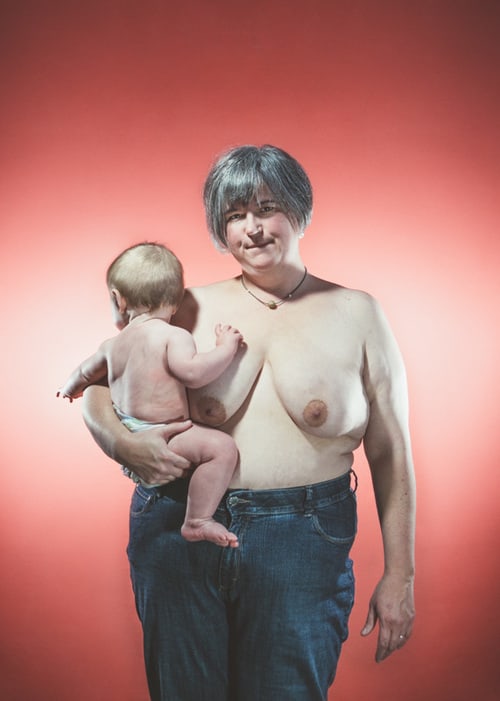


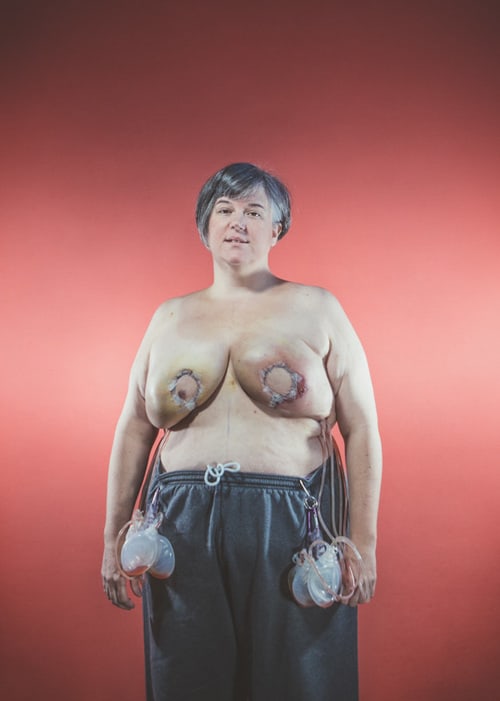


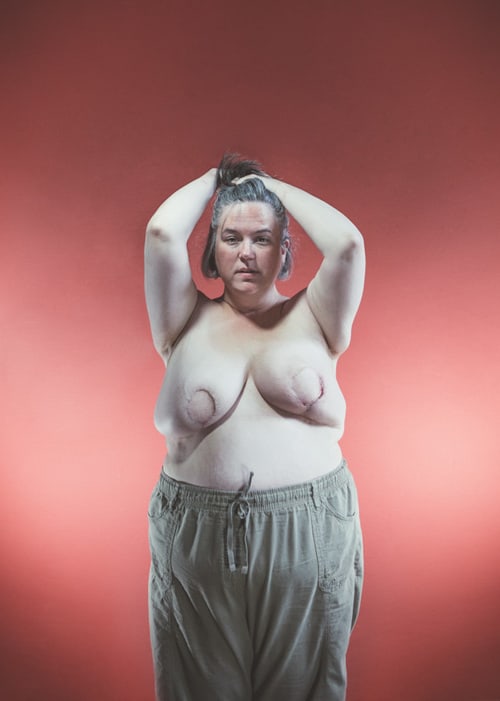


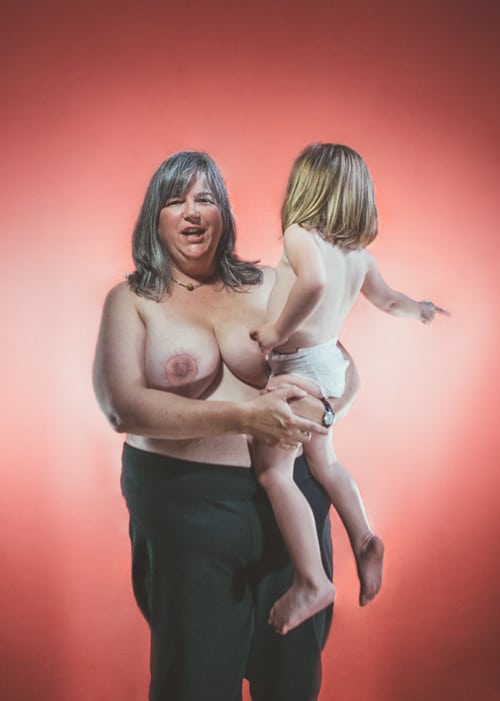

Images from Processing the Destination – documenting the progression of one woman's life over two difficult years as she undergoes a double mastectomy and breast reconstruction surgery.
Savor that! There seems to be a great comfortability with nudity in your work, and yet, a lack of sexuality, which tends to be wrapped up in most nude work. Where do you think that comes from?
I’ve always been a questioning person. I was raised religious, and I don’t remember what age I was, but I was like, “this makes no sense, this is stupid.” And then I kind of fought back with my anger, at that point, because I didn’t have all the information, I was like this is stupid, fuck this. And then I got older and became more informed about it, and thought, “of course this makes no sense, because X, Y, and Z.” Fighting things that don’t make sense to me, like body shaming, and shaming women for being sexual, or being ashamed of your body, or thinking your vagina looks gross because it doesn’t look like the photoshopped vaginas in Playboy magazines, you know the labial surgery where they get their labia shaved? It’s terrifying. Women, I don’t know if this is still a trend, but Playboy, how they got their magazine to be…you weren’t allowed to have hardcore nudity, so that was genital detail, so the labia manora that comes out of vaginas is considered genital detail.
I saw one once!
So what Playboy would do, they would Photoshop that out so it would just look like this…
You mean they don’t really look like that?
Fuck you! Hahahahaha! So they photoshopped that out, so women and men were seeing that over and over again, and they thought that that was what a vagina looked like, but it wasn’t, so women were getting these surgeries to get that shaved off, and it’s just like AHHH. So, point being, I hear this stuff and I feel bad for people who don’t know this information, so let me, in the way that I can, because I feel like my point in this world is to make it a better place before I leave, and the only way that I can do that is fighting situations where I’m in a social situation and I hear something, I say something. Or with my art, that’s how I do that, versus being a social worker or a lawyer, not that lawyers help that much.
Hahahaha!
So that’s why, with the nudity thing, I have always been questioning why do people feel that way about their bodies, and even I did as a young adult. I think only around twenty-four was when I started becoming super comfortable with my body, and that’s a really long time to be shitting on your body, to feel like you’re ugly and gross. So I thought, “oh, this is what it’s like to not feel that way, so let me help other people.”
Do you feel that photography helped you feel more comfortable with that? What I find both unusual and cool is that you include yourself…
In my images? Yeah, I think I started out wanting to do nude work because it was one of those things where I was thinking, “why are people ashamed of being naked and why are people, in America, so ashamed of sex and blah blah blah,” so I started off wanting to do nude work because it was a) interesting, also b) as a starting photographer, you’re like “I’m going to do edgy things!” So I thought nudity was edgy, so that’s what I was doing. But for me, being in the photographs, it was just something that…it might be a little narcissistic, but it was also…why not be a part of it? With Illusions, I just knew I wanted to add another person because then I had way more people in the series, show more body types. And then with the crying one, I just, I wanted to do it because I wanted to document what I look like crying, and I knew I could fucking turn on the water works, especially at the end of the series where I had, fuck, I don’t know how many people are in it, but a decent amount of people that I had seen crying in front of me, and there was a lot of them where they started crying and then I started crying because it was really sad. At the end, I realized I can turn on my crying mechanism really fast, it will be easy, I can see what I look like.
Because there’s also a more informal series I think you did three Octobers in a row where you photographed you and your, at the time, boyfriend? There also seems to be an exploration, documentation of your own life?
Yeah, I’ve really invested in that project, I think it’s really interesting, because it documents my life, it’s like a journal, essentially. My boyfriend and I, we had ups and downs. But it’s one of those things where I can look back and see a) what I look like, b) what I was going through, because there are photos where I’m mad at Rob and crying in them, and him looking annoyed. The first year when I looked at it, I could see, as an objective viewer, how my personality is, and how his personality was, which is goofy and kind of doesn’t give a shit about anything, and where I’m mad and stressed out all the time. And to see the evolution of that…I guess the project is more about me, and for me, than it is about anything else, but I think after ten years it will be super-interesting and worthwhile. But yeah, the nudity is in it, because it’s a part of life. I can see one year I actually, maybe last year, I did give a shit about what I looked like, because I was kind of depressed. And I can see how I didn’t put effort into that, and wasn’t as nude as I was in previous years because I didn’t care about that, if that makes any sense?
There’s a portion of self-discovery?
Yeah, for sure. That’s all that I’m doing, is discovering things about me through my work, but also about life, and also sharing my ideas about life, which is all I have.
And now our patented TPJ question: which do you prefer: the process, or the result?
Hmm…I don’t know. The result is way easier to digest and to do, because then I don’t have to do anything anymore. I guess I’m really lazy, because what I like is not having to do anything. The process is more consuming, the result is easy.
Do you prefer having the finished images more, or do you prefer the act of photography?
Probably the act of photography, because it’s just brain exercises, I’m actually doing something. Whereas the end result, for the most part I’m like…there’s the stages of like, “this is shit, maybe this is okay,” and then people telling you that it’s good and you’re like, “they’re stupid.” But it’s good, I don’t know! Then you forget about it and what you think about it. So I don’t know, probably the process. I would go with the process because it’s more fulfilling.
Right on! That about does it! Thank you!
Thank you!!

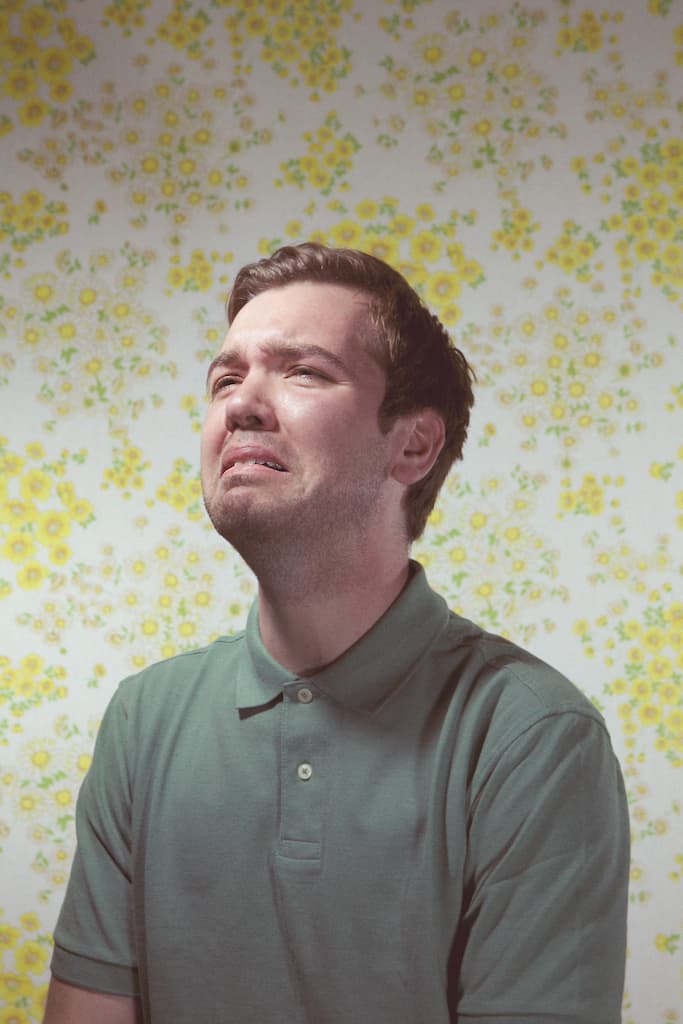


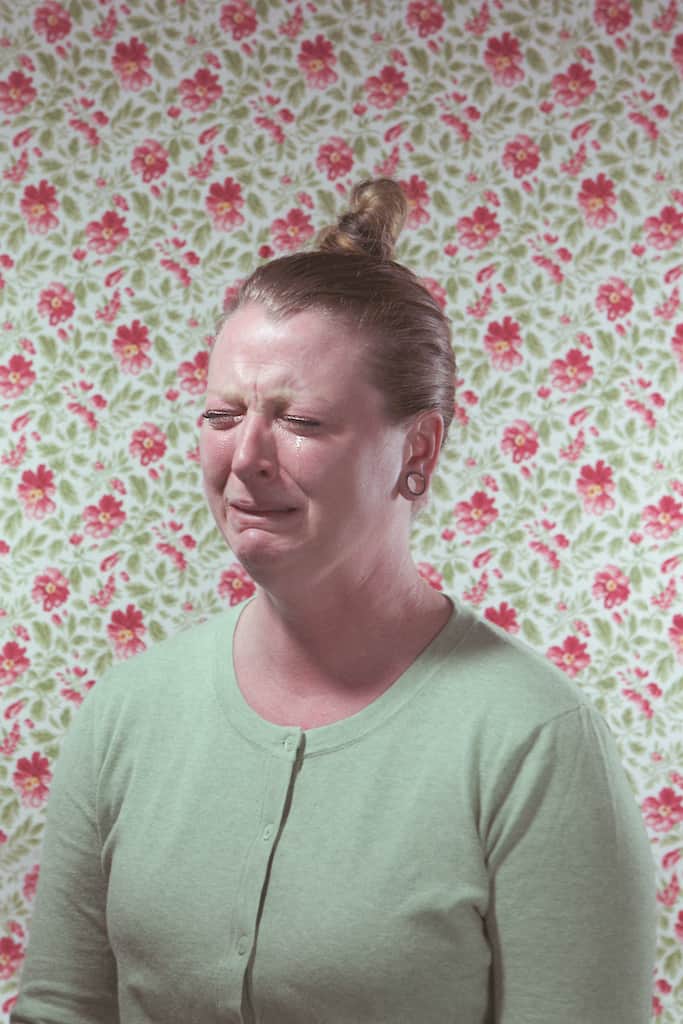


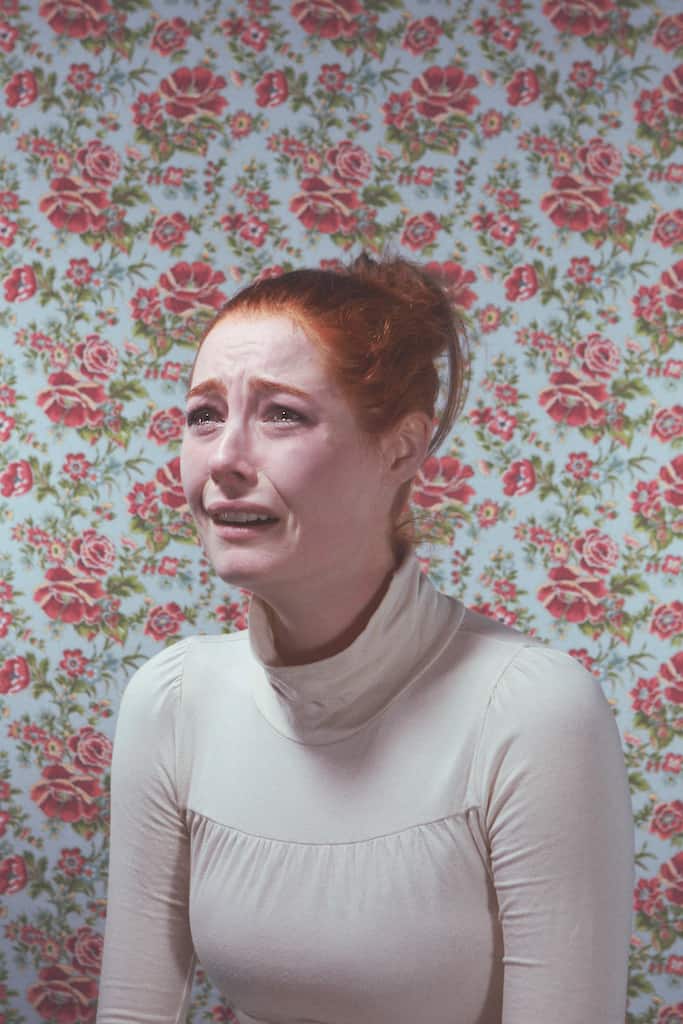


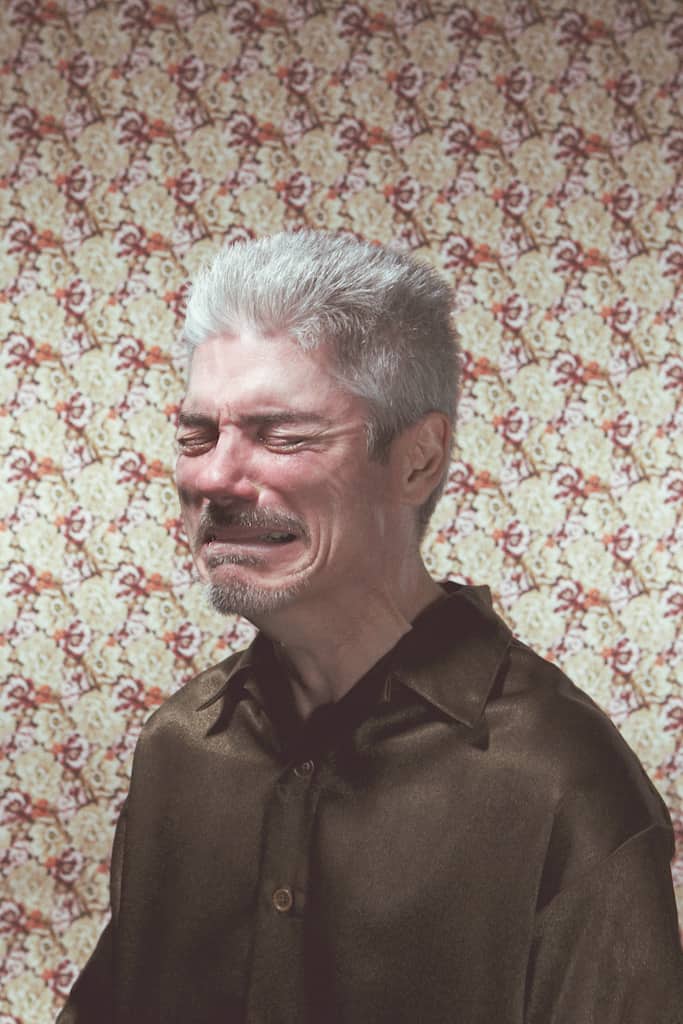

Images from Secretomotor Phenomenon – In an age where nudity is less vulnerable than genuine emotions, I wanted to explore an aspect of peoples lives that are hidden.